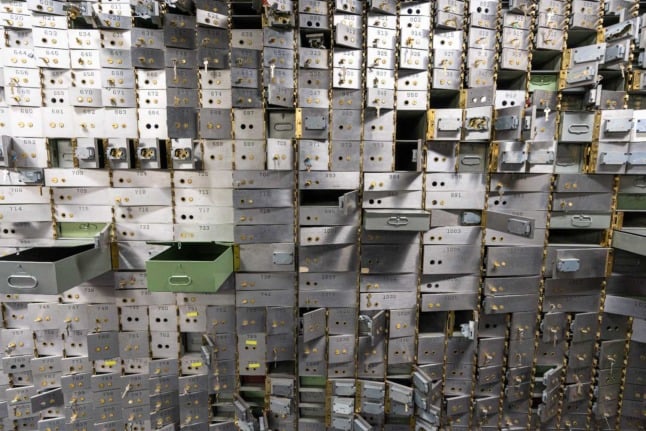To get the lowdown on where to keep your money as a foreigner living in Switzerland, we asked our readers for their inside tips.
Here’s what you need to know.
Not American? Then check out the following link.
EXPLAINED: Which banks are best for foreigners in Switzerland?
What banks are available in Switzerland?
While there is a myriad of financial service options available in Switzerland, the Swiss banking sector is divided into three loose categories: big banks, cantonal banks and new players.
The big banks are the major retail banks in Switzerland. This includes UBS, Raiffeisen, Credit Suisse, Migros Bank and PostFinance.
The cantonal banks are, as the name might suggest, banks that are in particular cantons. There are 24 cantonal banks in Switzerland (i.e. in all cantons except Solothurn and Appenzell Ausserrhoden).
Cantonal banks are only open to residents of those cantons.
The new players include ‘neobanks’ like Neon, CSX (subsidiary of Credit Suisse) and Yapeal, among others, along with more traditional newer banks like Valiant.
What are the rules for Americans banking in Switzerland?
The most important among them is the Foreign Account Tax Compliance Act (FATCA), which was passed by Congress in 2010 and went into effect on January 1st, 2014. It requires foreign banks to report to US tax authorities (IRS) all the assets that belong to US citizens – whether living in America or abroad.
The question of which Swiss bank is best for Americans is one we’ve been asked before by readers, although the experience people have tends to differ dramatically.
Some readers have told us it was almost impossible.
“I’ve been ‘bank shopping’ here since I arrived eight months ago, but nobody wants to open an account for me once they find out I am American”, Terry, who is married to a French citizen and lives in the suburbs of Geneva, told The Local.
One reader, Sue*, got in touch with us to say that she eventually renounced her US citizenship in order to be able to have banking freedom in Switzerland.
READ MORE: Why are Americans being turned away from Swiss banks?
Prior to that, she had “no financial independence” and was forced to rely on her husband.
“I was Swiss but had no rights, because I was also an American, to hold my own bank account without depositing very large amounts to purportedly justify the additional work by the bank to do all the necessary reporting to the U.S,” Sue said.
Sue said she was told she needed to deposit “a six figure sum” in order to have the account opened – and eventually decided to give up her US citizenship.
Another reader, Georges, who was born in Switzerland, did the same.
Other readers however have said that while it isn’t easy, Americans need to shop around to find the right account.
Sofia, in Geneva, said the problems for Americans getting an account were “not nearly as drastic as the article portrayed (speaking as an American living in Switzerland (since) 2011)”.

Which bank is best for Americans in Switzerland?
One which ranked highly was Swiss online bank Neon, which is one of the wave of neobanks which have grown in popularity recently.
READ MORE: How to open a bank account in Switzerland
Neobanks offer many of the services of a regular bank – including an IBAN for transactions, credit or debit cards and online payment options – but there are no branches or locations.
Their fees also tend to be much lower than traditional banks. Mikołaj, from Zurich, said Neon came out on top as it was “completely free” with “service in English”.
Shahram, from Zug, told us that Neon was the best option for people “who want to save money and only need online banking”.
Another bank which several of our readers recommended was UBS.
Steve recommended the UBS Family Account for its visa debit and Apple Pay links, as well as the functionality of its app.
Sofia, in Geneva, also recommended UBS.
Shahram said UBS was particularly good for foreigners as their “transfer rates to move money abroad tend to be more competitive”.
“It has a good network in Switzerland and abroad”.
Bob recommended Credit Suisse, saying it was “modern, English was spoken by all bankers and (it has) very good e-banking”.
Simon, from Chur, was the only reader to recommend a cantonal bank. After looking around, he eventually went with the Graubundner Kantonalbank.
“I looked at several, UBS and Post Office, but the most friendly and accessible were the Kantonalbank. We were immediately assigned a manager, and he was super helpful. More so than UBS and Post Office,” he said.
“Of course you must be present to open the account. The fees are also reasonable.”
Simon also told us that the internet banking portal was good “better than HSBC in the UK”.
Which banks will open an account for Americans in Switzerland?
Several other American readers also told us UBS was the best option for Americans in Switzerland. While the fees were high, they would offer to open an account without a minimum deposit.
Sofia told us there was just more paperwork for Americans.
“UBS does still have American clients (you have to visit in person at the main branch in your city and sign documents about FATCA compliance), Post Finance will also open accounts, and so do some of the cantonal banks. It’s far from impossible,” she said.

Bob told us that Credit Suisse would open accounts for Americans, provided you waive the right to bank privacy in order with IRS regulations.
“(Credit Suisse are) pretty good at getting the annual form sent to the US IRS right. Just waive the bank privacy, fill out a US W-9, and no problem being a US citizen if you have a CH residency permit. Private bankers are very responsive.”
Eric, from Lausanne, pointed to UBS’ special accounts for Americans as a reason to sign up.
“UBS – (has a) separate bank for Americans and also one of the only ones (to offer banking to Americans),” he said .
“They are expensive like every bank but do not have minimum requirements like some of the other banks. Also, if you have a partner that is not American they have to have a separate account for you”
Travel: Six ways to save money while visiting Switzerland
Jeremy also told us that he was able to open an account with UBS once he received his Swiss residency documentation.
“I am an American and moved to Switzerland recently. I did not have a problem opening an account once I received my B-permit. This said, the FACTA requirements are an annoyance, requiring additional paperwork.”
Nick, an American who lives in Bern, however said he was turned down by UBS – along with Credit Suisse – who told him he would need to wait for over a year before he could open up an account.
“Local banks won’t touch Americans due to (American) regulations,” he said.
He went with Valiant because it was the “Only bank that would open an account for me.”
Which bank should foreigners avoid in Switzerland?
If you want to avoid paying high fees, several readers told us to avoid the big banks like UBS and Credit Suisse.
Mikołaj said to avoid UBS as it was “absurdly expensive”.
One American reader, Jeremy*, told us UBS told him he needed to deposit a minimum of CHF2 million in order for the bank to waive its high fees – an amount that he did not have.
“All the banks charge annual fees and provide no interest to konto (account) holders. Yet, these very same banks report astonishing profits year-after-year. There are no credit unions. The people that appear to profit are the people that are already rich. Us average blokes cannot get ahead.”
Whether English was spoken is another factor. Although most Swiss banks have English portals on their websites, readers told us there are often problems communicating with banks in English.
Steve told us this was a problem at cantonal banks.
“If you don’t speak German then the smaller cantonal banks can be a pain but they are getting better”.
Shahram also said cantonal banks “were limited” and may not be ideal for foreigners.
Simon said foreigners may face issues with cantonal banks as the banking apps only work on Swiss mobile phones.
*Persons appearing with an asterisk had their names changed at their own request.
This report has been put together as a guide only and The Local has not received any juicy kickbacks from these banks, nor do we endorse one organisation over the other.



 Please whitelist us to continue reading.
Please whitelist us to continue reading.
Member comments